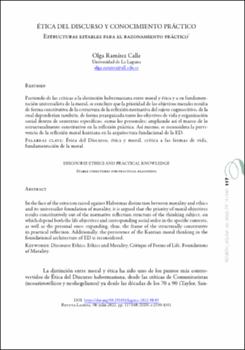Ética del discurso y conocimiento práctico. Estructuras estables para el razonamiento práctico
Autor
Ramírez Calle, OlgaFecha
2022Resumen
Partiendo de las críticas a la distinción habermasiana entre moral y ética y a su fundamentación universalista de la moral, se concluye que la prioridad de los objetivos morales resulta
de forma constitutiva de la estructura de la reflexión normativa del sujeto cognoscitivo, de la
cual dependerían también, de forma jerarquizada tanto los objetivos de vida y organización
social dentro de contextos específicos, como los personales; ampliando así el marco de lo
estructuralmente constitutivo en la reflexión práctica. Así mismo, se reconsidera la pervivencia de la reflexión moral kantiana en la arquitectura fundacional de la ED. In the face of the criticism raised against Habermas distinction between morality and ethics
and its universalist foundation of morality, it is argued that the priority of moral objectives
results constitutively out of the normative reflection structure of the thinking subject, on
which depend both the life objectives and corresponding social order in the specific contexts,
as well as the personal ones; expanding, thus, the frame of the structurally constitutive
in practical reflection. Additionally, the persistence of the Kantian moral thinking in the
foundational architecture of ED is reconsidered.





